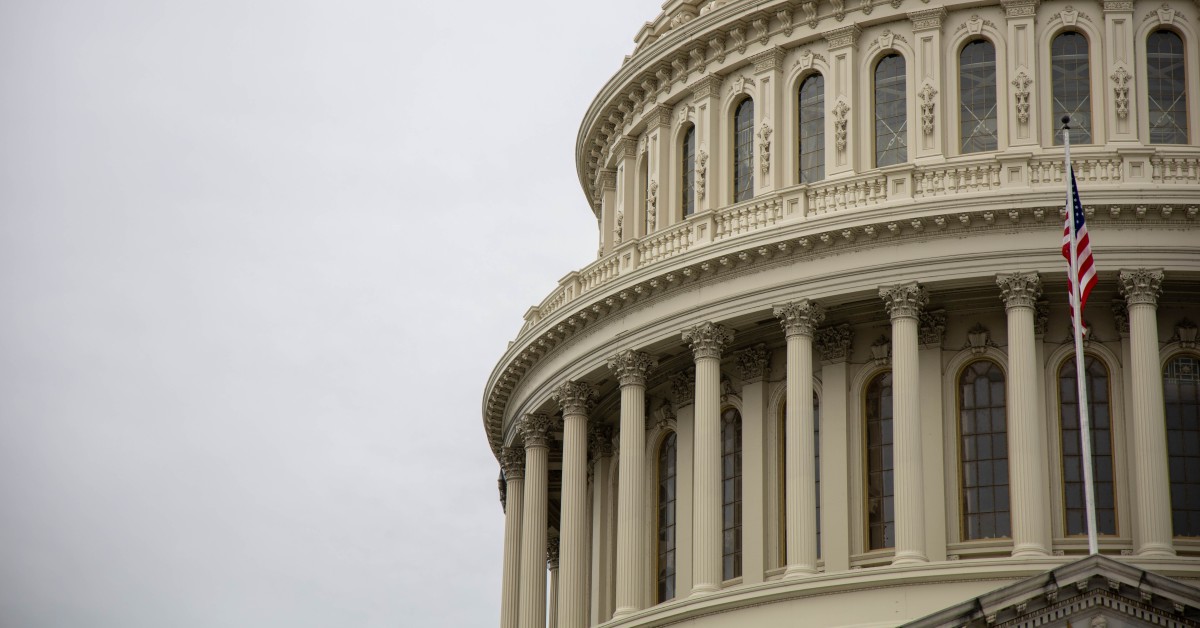
Master's in Cyber Security or a Master's in Homeland Security?
Deciding between a master's in cyber security and a master's [...]

You don't necessarily need an advanced degree to make the world a better place. It may be easier to turn that ambition into a lifelong career, however, when you have the right credentials. If you love helping people (and wouldn't mind a pay raise as well), a Master of Public Policy might be the degree for you.
Many people work in public policy without earning a master’s degree. That’s because—to put it bluntly—getting a master’s degree can be expensive, and public service tends not to pay well. It’s doable. Still, some desirable public policy positions are open only to master’s holders. If you aspire to one of those, you’ll need an advanced degree. Further, it’s worth noting that public service jobs aren’t the only opportunities for Master of Public Policy holders.
Lucy Xi Liu, a consultant at Gallup, Inc. and a graduate of the Lee Kuan Yew School of Public Policy at National University of Singapore, told Devex: “By the end of an MPP program, you can expect to better know yourself and your strengths, and how you can use these strengths to make a difference“—specifically in the private sector, where the pay is usually higher and the opportunities to do good can be as great.
The MPP is a broad interdisciplinary master’s degree that helps public policy professions developer stronger critical thinking, quantitative, and analytical skills. All are necessary to analyze urgent public policy problems and design workable solutions. Graduates of the best MPP programs are equipped to become public policy leaders in a variety of specialty areas, and they don’t necessarily work in the government or non
profit spheres. Intrigued? In this guide to a Master of Public Policy, we’ll cover:
The government, private sector, and nonprofit spheres all hire Master of Public Policy graduates. MPP holders work in a variety of settings, such as:
Did that last item surprise you? Businesses in the private sector have always hired Master of Public Policy graduates in government advocacy and government relations roles, but now they’re also hiring MPP holders in positions traditionally held by MBA graduates like program analyst, program manager, and community or public relations manager (hence the nickname ‘MBA of the public sector’).
You can find Master of Public Policy graduates in roles like:
These professionals help cities and towns plan for growth, design communal spaces, analyze traffic systems, revitalize existing properties, and assess infrastructure to meet the needs of residents and visitors. Urban planners earn about $73,050 per year.
In the public sector, policy analysts assess and adjust existing policies or develop and implement new ones in such areas as:
In the private sector, these professionals lobby for government regulations that benefit their employers. The average policy analyst salary is $57,695 per year.
In this role, you’ll oversee and assess the development and implementation of government policies and services. Regional government officers are typically focused on efficient delivery and effectiveness, but they may work exclusively in specific areas of local government such as education, recreation, or environmental protection.
These professionals look closely at how existing and new government policies affect corporations and then develop strategies to mitigate the impact, if negative. The government affairs director may also serve as the representative of a corporation, communicating on behalf of their employer and lobbying for beneficial legislation. Government affairs directors earn about $97,765 per year.
In this role, you’ll commission and analyze qualitative and quantitative research to determine whether government policies are working as intended. You’ll also prepare reports for legislators to enable them to make well-informed decisions about changes to existing policies and the implementation of new ones. The average social research officer salary is about $113,102 per year.
These professionals work in research agencies, large corporations, polling agencies, and think tanks developing and then overseeing large-scale surveys. The average survey researcher salary is about $54,237 per year.
This is primarily a research position. In a political science role, you study how policy changes influence political systems and how different governments handle policymaking. You will look at political trends over time and across localities, policymaking styles, and data related to relevant policies. The average political scientist salary is about $52,910.
These professionals work to persuade elected officials to pass, amend, or vote against laws and regulations that are of interest to their employers. They may also create and launch campaigns designed to influence voters. The average lobbyist salary is $73,950 per year.
The specific responsibilities of these professionals are hard to pin down because they work in a multiple public service areas. In general, they research policy issues, prepare policy proposals, oversee programs, design and implement policies, and supervise staff. The average public service administrator salary is $81,015 per year.
Don’t assume that working in the private sector with an MPP is unusual. The breakdown of employment sectors of actual MPP graduates, according to the 2018 Harvard Kennedy School Employment Overview, may surprise you. A plurality—38 percent—of MPP graduates went on to work in the private sector at companies like Bain & Company, Booz Allen Hamilton, Google, Netflix, and The Wall Street Journal. Only 30 percent went on to work for nonprofit organizations, and just 21 percent went on to work in national, state, and regional government agencies and organizations.
Your assumptions about the salary differences between those spheres, on the other hand, are probably correct. A 2016 career outcomes survey by the Career Development Office of the University of Chicago Harris School of Public Policy found that the median salary for MPP graduates working in the private sector was $75,000, versus $61,080 for those in government jobs and $60,000 for nonprofit employees. The difference in overall earning potential was a lot larger. Top-earning private-sector Master of Public Policy graduates were making $180,000 while government workers topped out at $110,000 and nonprofit workers at $130,000.
The most important prerequisite you need when applying to Master of Public Policy programs is a bachelor’s degree. You can’t go wrong enrolling in a public policy bachelor’s degree program (e.g., Arizona State University – Tempe‘s BS in Public Service and Public Policy or Wilmington University‘s BS in Government and Public Policy), though students with degrees in economics or political science are also accepted in Master of Public Policy programs. Some of these programs require students to have completed one or more statistics or economics courses at the undergraduate level before applying.
Many MPP programs are designed for students with some work experience related to public policy, so you may be asked to provide a CV as part of the application process. Even programs that don’t specifically require applicants to have experience in the field may favor applications that demonstrate relevant work experience. If you’ve only just graduated with a bachelor’s degree and want to get into a top program, consider amassing a few years of work experience before applying (unless you were able to complete an internship in the public policy field).
Comparing universities can be difficult, given how different the same degree pathway can be at two or more schools. That’s why it’s crucial that you not only consider a university’s reputation but also how you’ll benefit from that school’s MPP program. Consider the following questions:
Remember that sometimes a program that’s highly ranked on paper may not be the best fit for your interests and career goals.
You can expect to spend two years pursuing a Master of Public Policy degree if you have the time and the resources to study full time (whether on campus or online). It is possible to graduate faster, however. Many universities, including Princeton and Harvard, offer one-year MPP programs. If you want to (or have to) study part-time, expect to study for three years or longer.
Master of Public Policy programs are interdisciplinary, which means you’ll study more than just policy. The core curriculum in MPP programs typically includes classes like:
These and other classes are designed to give graduates the knowledge and skills to perform advanced political, economic, ethical, and data analysis and to be effective leaders.
You won’t be bored during your graduate study years in one of these programs. In and out of class, you’ll be expected to dig into juicy policy dilemmas related to everything from farm subsidies to clean air. You’ll tackle significant policy questions, solve major policy problems, and analyze the impact of contentious legislation. In the process, you’ll learn to weigh your desire to create perfect solutions against the need for public buy-in for any new policy to be successful.
Be aware that almost all of the projects you tackle in your MPP program will be group projects. That’s by design: public policy work is mostly collaborative, whether you’re working in a government agency or for a consulting firm. As you advance in your career, you will have to be comfortable both working on and managing teams, organizing and allocating limited resources for disparate or cross-cultural groups, and keeping complex projects with many stakeholders on track. The group work you do as you pursue this master’s degree will be hugely valuable when you transition back into the working world.
In addition to completing your MPP program’s core coursework requirements, you may be able to choose a specialty area and take elective classes related to it. At Harvard, Master of Public Policy students declare specialty areas in the final year; every university structures its program differently. Students at some schools take specialty-specific classes from the get-go, while students at other schools may spend the first half of an MPP program doing core work and the second focused exclusively on meeting concentration requirements.
The MPP concentrations offered by most schools mirror the specialties within the public policy field, but it’s essential to understand that not every university offers every concentration. Students across schools choose specialty areas such as:
Not all Master of Public Policy programs culminate in a capstone course and project (or less often, a thesis), but many do. Fulfilling the capstone requirement typically involves completing a semester-long research project related to your chosen concentration. You will use the policy analysis skills you’ve learned to determine whether one or more policy solutions to a real problem will be successful. Sometimes the length of the capstone course mirrors the period required to prepare a policy brief. At the end of the course, you’ll present your findings in a written paper and oral presentation.
There are a lot of great MPP programs out there. The best earn accreditation from the Network of Schools of Public Policy, Affairs, and Administration. NASPAA accreditation is the gold standard when it comes to Master of Public Policy programs, and there are currently 64 accredited MPP programs on their roster. Those programs have been thoroughly vetted to ensure they meet specific benchmarks and conform to NASPAA best practices.
It’s worth noting that a public policy degree from a top university may not be as valuable as a degree conferred by the exclusive business or law programs at those schools. Not all academic departments at a university carry the same cachet, even at top schools. It doesn’t make sense to pay more for a degree just because a university has a notable name.
Finally, if you’re particularly interested in working in one specialty area, look for MPP programs that offer a relevant concentration.
Fans of public policy may find they’re torn between Master of Public Policy and Master of Public Administration (MPA) programs. In general, the MPP is the better choice for aspiring policy analysts who want to look at statistical and economic data to assess existing policies and develop new ones. The MPA is a better degree for students who want to manage projects and people related to public policy issues.
A Master of Public Policy, as noted earlier, is not strictly necessary if your goal is to advance in the public policy world. Neither is going to graduate school. There are, however, some compelling reasons to consider pursuing this degree.
First, going back to school for public policy can lead to valuable networking opportunities. The public policy sector is a relatively small one, and it’s not uncommon for career advancement to be based on who, not what, you know.
Second, just because you’ve built a successful career in public policy doesn’t mean you’ve picked up leadership skills. While the MPP is very much a practical degree, it’s also one designed to help you learn to head up projects.
Third, if you’re already an expert in an area closely tied to public policy (e.g., environmental science or macro-level social work), earning a public policy master’s degree can help put you into a position to tackle big-picture issues.
When people list the downsides of pursuing a Master of Public Policy, they usually point out that master’s degrees can be expensive, and jobs in the public service sector aren’t going to turn you into a high roller. This is true, but there are no guarantees that you’ll land a job with a fat paycheck after graduating with any master’s degree. Average salaries for positions held by MPP graduates aren’t that low, and you don’t have to limit your job searches to the public sector. There’s plenty of high-paying work for motivated MPP graduates in the corporate world. And remember, there’s more to job satisfaction than making a lot of money. Making a difference matters too.
Questions or feedback? Email editor@noodle.com

Deciding between a master's in cyber security and a master's [...]

Earning an education master's degree can lead to great careers [...]

At the local, state, and federal levels, government work requires [...]

Earning a master's degree in homeland security can qualify you [...]

Homeland security encompasses more than just counterterrorism,disaster response, cybersecurity, and [...]
Categorized as: Public Administration & Policy, Nursing & Healthcare